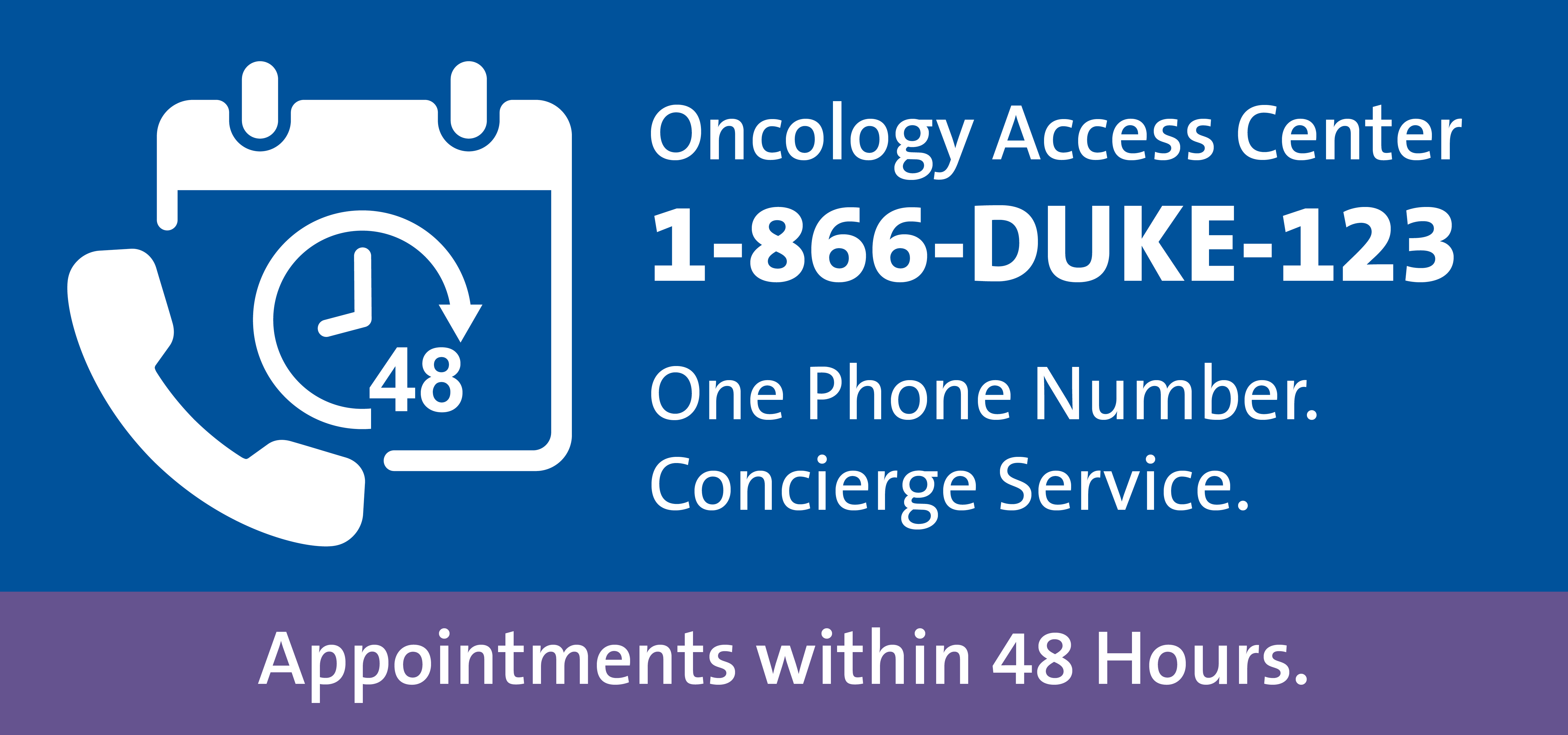
Our referring provider team makes referring patients to Duke Cancer Centers efficient and easy. Call Monday through Friday, between 8 a.m. and 4:30 p.m.
You can also email OncologyReferral@Duke.edu or use the referral form below.
Through a multidisciplinary workflow, the Duke Breast Oncology Program tripled point of care (POC) genetic testing rates among patients with an active breast cancer diagnosis, powering the team to reach more patients faster.
Jennifer K. Plichta, MD, surgical oncologist and co-director of cancer genetics at Duke Cancer Institute (DCI) explains, “POC genetic testing is a standard part of each qualifying patient’s first appointment. A test is initiated, the genetics team is engaged, and we move forward together.”
For patients, this model eliminates additional referrals and appointments for genetic testing. While convenient, there’s greater impact, explains Plichta. “The faster we get results, the sooner we can initiate treatment. This shaves off days, and faster is better in cancer care. Patients are grateful for getting knowledge sooner and providers are supportive of getting this done.”
Faster informed care
According to Certified Genetic Counselor Maggie A. Frazier, an essential aspect of the program’s feasibility was adding a patient coordinator and genetics counseling assistant to facilitate patient eligibility, education, testing. “With everyone working together and within their scope, we’ve seen a notable uptake in the number of patients we’re able to test and counsel.”
After testing, patients’ results are routed to their treatment team, genetic counselor, and referring physician for case collaboration. Plichta says, “It’s important for breast cancer patients to know their genetic results upfront because they may make different surgical and treatment decisions.”
Then, genetic counselors consult with patients about positive results, management options, and other significant implications. Frazier adds, “We inform patients about additional cancer risks and emphasize cascade testing for family members. This helps loved ones identify their risks and get quicker care as well.”
Collaborative care through survivorship
Into survivorship, POC genetic counseling gives patients a long-term risk profile and roadmap for proactive screenings and follow-ups.
For patients at risk for recurring breast cancer, screening protocols may include more extensive diagnostics, such as a mammogram, ultrasound, and/or breast MRI. If patients are at risk for secondary cancer, they’re referred to a respective specialist for their screening recommendations.
Plichta comments, “Our program’s strength is collaboration. We bring multidisciplinary teams together and give patients information and resources to make the best choices for them.”
Because of her leadership and success in launching the DCI POC model for the Breast Oncology Program, Carolyn Menendez, MD, was recruited to lead the VA’s new dedicated cancer genetics services, and create a pathway for the VA’s national POC program across 10 cancer types.
Six months post launch, the program has conducted over 470 tests. And that number continues to grow.
“We had to come up with a core concept that was scalable for 10 cancer types. I applied a lot of what I learned at Duke, and simplified the process to work for a national system. We’re getting patients quicker testing, and that’s what our veterans deserve,” says Menendez.
As a current breast surgeon at DCI, Menendez and the Duke Clinical Cancer Genetics team stay in close collaboration. “We meet often to actively share insights through case conferences and other touch points,” Menendez adds.
A path to expansion
The program’s success is the result of a six-year iterative process to test, learn, and evolve a model that’s efficient, effective, and patient-centered, explains Carolyn Menendez, MD, former DCI director of cancer genetics, current DCI breast surgical oncologist, and current director of the Veterans Administration (VA)’s National Clinical Cancer Genetics Program.
During her five-year tenure as DCI cancer genetics director, Menendez was fundamental in launching breast POC genetic testing before passing leadership to Plichta and Andrew Berchuck, MD, Chief of Gynecologic Oncology in December 2022.
“Instituting a POC program was my number one priority at DCI. I’m proud of the model we built for the breast program and knew Plictha and Berchund could take POC higher and higher across DCI,” says Menendez.
In her current role at the VA, Menendez applied learnings from her experience at DCI to scale and launch the VA’s national POC program for 10 cancer types.
Now, DCI is poised to expand its POC model across ovarian, prostate, and pancreatic cancer programs in the near future.
Plichta concludes, “We’re committed to providing better patient care and that’s what we’re doing. We know it can be better, we want it to be better, and we’re willing to put in the hard work and resources to make it better.”
